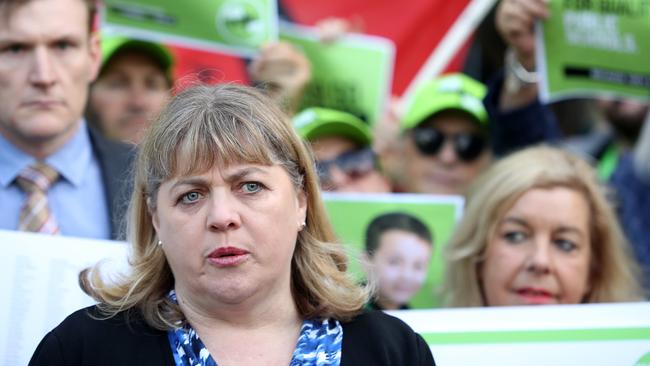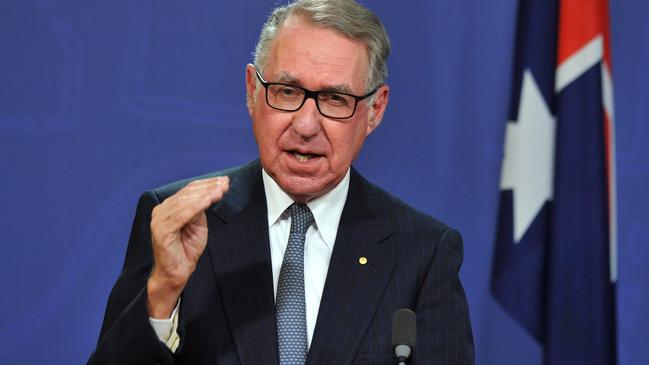‘Test doesn’t improve education’: teachers’ union questions Gonski 2.0 recommendations
The AEU has questioned the plan to lift education out of its rut, arguing the recommendations require a lift in spending.

The teachers’ union has questioned the government’s plan to lift Australian education out of its rut, arguing that the recommendations made in the latest Gonski report will require significant financial investment.
Australian Education Union president Correna Haythorpe said this morning that the report was comprehensive and highlighted the challenges facing education, but that it did not go far enough in addressing the resources shortages facing public schools.
Singling out the report’s proposal for the development of a new assessment tool that would enable teachers to track their student’ progress in meeting their individual learning goals, Ms Haythorpe said it was difficult to talk about new testing frameworks without first dealing with “funding inequity”.
“Taking a test does not improve education outcomes, rather it identifies where there are student learning needs and them schools can target programs to support their students,” she said.
“We know that when schools have the resources they need to give students the individual attention they need.
“Given there are a number of recommendations that could deliver positive results, the Turnbull Government must resolve the funding shortfall for public schools.”
Ms Haythorpe also took issue with some of the rhetoric being used to describe the report, which followed an eight-month review led by businessman David Gonski. She denied that students were “coasting”, as Prime Minister Malcolm Turnbull described this morning,
The report was scathing of the decline of Australian education over the past 20 years, claiming that the system had “failed a generation of Australian schoolchildren”.
Critical thinking trumps knowledge in Gonski 2.0

Schools would be required to prioritise the teaching of critical thinking, creativity and social skills under recommendations to come out of the Gonski review into boosting student achievement, despite mounting scepticism internationally about the feverish promotion of those skills in the classroom.
A report, to be published today, proposes a “radical overhaul” of the national curriculum to ensure that “general capabilities” are placed at the core of what students are taught. It notes that declining student outcomes are national and widespread across all sectors.
“Its extent indicates that Australian education has failed a generation of Australian schoolchildren by not enabling them to reach their full learning potential,” the report says. “The importance of this point can hardly be overstated. In 2015, Australia’s 15-year-olds as a group scored significantly lower that 15-year-olds in 2003 on an equivalent test.”
The report also recommends personalised learning and teaching based on each student’s needs, as well as a move away from a year-based curriculum to one targeted to a student’s personal achievement regardless of age.
Each student would be supported to achieve at least a year’s worth of progress each year.
When it comes to assessment, the report found conventional reports that traditionally give an A to E grade based on year-level achievement standards could be improved upon. Instead, students should be assessed by the rate of progress and attainment of knowledge and skills based on challenging personal targets, it says.
The focus on critical thinking, creativity and social skills will alarm many education experts, who have been lobbying for a return to a more robust, knowledge-based curriculum. Educational psychologists have spent the past decade questioning the drive to embed general capabilities — which include literacy and numeracy but also contentious so-called 21st-century skills such as critical thinking and problem-solving — arguing they develop only once a student acquires a deep knowledge of their subject matter.
Among the report’s 23 recommendations is an online assessment tool for teachers that could eventually see the NAPLAN test deemed redundant. The tool would enable a student’s progress to be tracked and compared with that of other students. Comparisons between different schools would also be available.
The report, Through Growth to Achievement, follows an eight-month review chaired by businessman David Gonski, which was to provide advice to the federal government on how to improve student achievement and school performance.
Malcolm Turnbull yesterday welcomed the report, describing it as a “blueprint”. “We are drawing a line in the sand to say with our record and growing funding secured, we now must focus on the reforms that improve education outcomes for all Australian students,” he said.
The report followed the Turnbull government’s announcement last year that it would inject an additional $23.5 billion over 10 years into the sector.
The government, which is understood to have adopted all of the report’s recommendations in principle, will present the report at a meeting of education ministers on Friday. The federal government plans to link funding increases to the states and territories to them agreeing to certain reforms.
Education Minister Simon Birmingham defended the report’s focus on the development of so-called 21st-century skills, saying employers were demanding that workers had particular skills to add value.
He said the panel had also spelt out the “critical importance” of literacy and numeracy skills as a “building block” of the curriculum.




